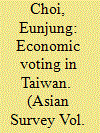| Srl | Item |
| 1 |
ID:
100585


|
|
|
|
|
| Publication |
2010.
|
| Summary/Abstract |
An analysis of the 1996 and 2004 Taiwan presidential elections demonstrates that the voters' overall economic experiences under the dominant Kuomintang and level of education mediated the effect of short-term economic conditions on individual vote choice before and after the first power transition.
|
|
|
|
|
|
|
|
|
|
|
|
|
|
|
|
| 2 |
ID:
164806


|
|
|
|
|
| Summary/Abstract |
In the past few decades, post-democratization politics in South Korea have witnessed an upsurge in authoritarian nostalgia, called the “Park Jung-hee syndrome.” This paper examines the origins of public nostalgia for the authoritarian dictator by putting two theoretical arguments, i.e., the socialization thesis and the system output thesis, to an empirical test. This paper utilizes the 2010 Korea Democracy Barometer from the Korea Barometer and the 2010 and the 2015 Korean National Identity Survey from the East Asia Institute. The empirical analysis of the South Korean case strongly supports the political socialization argument, suggesting that citizens’ yearning for Park Jung-hee is not merely an outcome of the negative evaluations of the democratic governments’ performances. Rather, their authoritarian nostalgia is in large part an outcome of their political socialization during the Park dictatorship. The analysis implies that, although a resurgence of the Park Jung-hee syndrome in post-democratization South Korea is not expected to derail the country’s route to democratic deepening, it may continue to be a main source of political division in partisan and electoral politics in the future.
|
|
|
|
|
|
|
|
|
|
|
|
|
|
|
|
| 3 |
ID:
126965


|
|
|
|
|
| Publication |
2013.
|
| Summary/Abstract |
Against all odds, South Korea's 2010 local elections were a landslide victory for the coalition of the opposition political parties. This article aims to provide an insight on the dynamic nature of Korean elections and politics by using a public opinion survey in Seoul's mayoral election as a case study. This article finds that the "north wind" triggered by the sinking of the South Korean battleship Cheonan helped the ruling party candidate, but not as much as the ruling party had hoped. Furthermore, a high turnout of the younger voters helped the opposition party candidate by showing a clear generation gap in terms of the important issues, ideology, and party orientation.
|
|
|
|
|
|
|
|
|
|
|
|
|
|
|
|